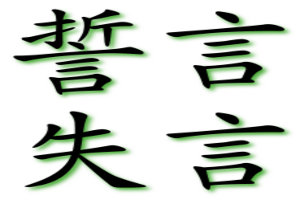Some fun with Mandarin homophones
I just came across this list of Mandarin homophones. The tones of the word pairs are different, but the pronunciation is otherwise the same. I’ve added pinyin and rough ‘translations’ into English as an explanation of each one:

北京,就是背景。 Běijīng, jiùshì bèijǐng. Beijing is the background.
上海就是商海。 Shànghǎi jiùshì shānghǎi. Shanghai is a sea of commerce.
老公,就是劳工。 Lǎogōng, jiùshì láogōng. A husband is hard labour.
晚上,就是玩赏。 Wǎnshàng, jiùshì wánshǎng. The evening is taking pleasure.
升职,便是升值。 Shēngzhí, biàn shì shēng zhí. A promotion is an increase in worth.
誓言,就是失言。 Shìyán, jiùshì shīyán. A promise is a slip of the tongue.
男人,就是难人。 Nánrén, jiùshì nán rén. A man is a difficult person.
理想,就是离乡。 Lǐxiǎng, jiùshì lí xiāng. Leaving the countryside is a dream.
缘分,就是怨愤。 Yuánfèn, jiùshì yuànfèn. Fate is resentment.
失去,就是拾取。 Shīqù, jiùshì shíqǔ. Losing something is gaining something.
清醒,就是庆幸。 Qīngxǐng, jiùshì qìngxìng. Being clear-minded is celebrating success.
结婚,就是皆昏。 Jiéhūn, jiùshì jiē hūn. Marriage is always muddle-headed.
研究,就是烟酒。 Yánjiū, jiùshì yān jiǔ. Studying is smoking and drinking.
There are of course thousands of these in Chinese, because the limited number of syllables in the language makes it extremely prone to homophones (and good for making puns).
